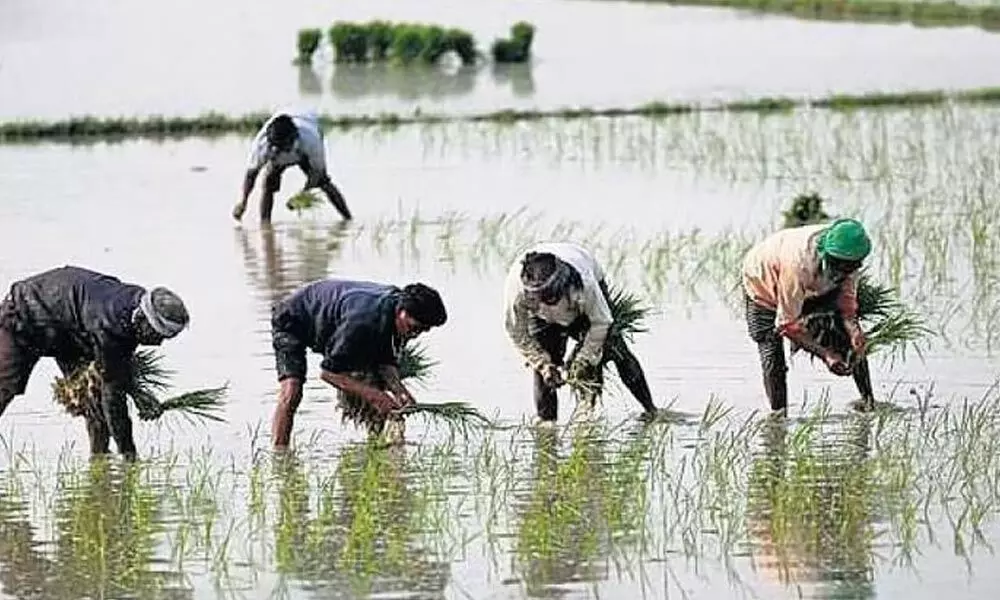Man From Kerala Preserves 650 Rice Varieties

For representational purpose (Photo/newindianexpress)
- An 18-year-old boy, Sathyanarayana Beleri, who used to harvest the rice field and the walkway that reapers used to carry the gathered paddy bundles and are now a one-man paddy gene bank, with 650 native rice types saved.
- He has rice paddies as tall as 13 feet and has rice varieties in black, purple, white, red, and light green.
An 18-year-old boy, Sathyanarayana Beleri, who used to harvest the rice field and the walkway that reapers used to carry the gathered paddy bundles and are now a one-man paddy gene bank, with 650 native rice types saved. He has rice varieties from Japan and the Philippines, as well as from far-flung states like Assam and Manipur, as well as neighboring states like Karnataka and Tamil Nadu. He has rice paddies as tall as 13 feet and has rice varieties in black, purple, white, red, and light green. He also has rice varieties that yield well in saline soil and in water-scarce fields.
For his efforts in preserving historic rice varieties, Union Minister for Agriculture Narendra Singh Tomar presented him with the 'Plant Genome Saviour Farmer Reward' on November 11 in Delhi. Since his land is not suitable for paddy farming, Sathyanarayana, who earns money from rubber, nutmeg, and areca nut, said he plants all 650 varieties of rice in a 25-cent artificially made paddy field. Sathyanarayana, a resident of Nettenige village in Kasaragod's Belloor panchayat said that 25 cents and only grow one species for the birds and rodents. He raises the rest of the types in grow-bags and covers them with netting. He has devised his own ways for preserving several rice landraces. For the best results, he utilizes paper cups and grows bags.
He sows about 20 seeds in a paper cup filled with potting soil. He transplants seedlings to grow bags after 10 days. He moves the grow-bags to a 30-meter-square plot where he has put tarpaulin after the paddy blossoms. He explained that the tarpaulin helps me save water and ensures that they grow bags have the right amount of moisture. Every year, he performs these steps for all 650 types of rice. The National Gene Bank in Delhi was so delighted with the procedure that it handed Sathyanarayana 30 types of rice to save. Paddy cultivars from him have been employed in breeding programmes at the Kerala Agricultural University in Thrissur and the University of Agricultural and Horticultural Sciences in Shivamogga.
Sathyanarayana learned in 2006 that Ramachandra Rao, a Gandhian and organic farmer from Cherkady, Udupi, was giving free Rajakayame rice seeds. He claimed that our home lacked a phone. So he wrote him a letter requesting Rajakayame seeds. Rao, a proponent of self-sufficiency in food production, sent him 100 grams of Rajakayame rice by courier. When he visited the father-son combo B K Devaraya and B K Parameshwara Rao in Belthangady, Dakshina Kannada, in 2009, he graduated as a rice conservationist. He explained that they had 150 varieties of rice and they gave me 100 variations. He expanded his genebank by bartering and exchanging. He added another 100 types to his collection last year, bringing the total to 650. The majority of the kinds he carries are from Shivamogga, Davanagere, Mandya, and Mysuru. In pursuit of rice, he traveled to Wayanad, Pattambi, Kuttanad, and Rajasthan. Vellathovan from Kerala and Puttabatta types thrive well in water-scarce areas, Karigajavali from Belgaum is renowned as the black basmati for its rich scent and colour.








